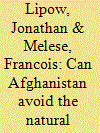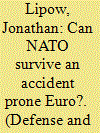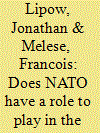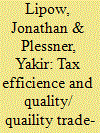|
|
|
Sort Order |
|
|
|
Items / Page
|
|
|
|
|
|
|
| Srl | Item |
| 1 |
ID:
129490


|
|
|
|
|
| Publication |
2014.
|
| Summary/Abstract |
Militaries commonly require recruits to pass a test that measures aptitude for military service. In this paper, we show that such tests may also act as a device for screening out low-motivation recruits, even if it is assumed that motivation is not measured by such tests and is not correlated with aptitude.
|
|
|
|
|
|
|
|
|
|
|
|
|
|
|
|
| 2 |
ID:
116068


|
|
|
|
|
| Publication |
2012.
|
| Summary/Abstract |
Recent discoveries of significant mineral deposits offer Afghanistan the opportunity to attain a level of economic development sufficient to stabilize that country's volatile security situation while providing Afghans with a reasonable standard of living. Much, however, depends on whether Afghanistan can avoid the "Natural Resource Curse," an inter-related set of economic and social pathologies that often bedevil resource-endowed countries. In this article, the authors describe the Natural Resource Curse, evaluate the obstacles it raises for Afghan economic development, and offer a strategy to minimize the risks Afghanistan faces in its efforts to exploit its mineral wealth for the benefit of the population.
|
|
|
|
|
|
|
|
|
|
|
|
|
|
|
|
| 3 |
ID:
114689


|
|
|
|
|
| Publication |
2012.
|
| Summary/Abstract |
The European Monetary Union (EMU) is inherently unstable, and will be prone to repeated financial and fiscal crises. These crises pose a clear threat to NATO security and the political institutions of Alliance member states. There is no definitive way to eliminate the risks posed by monetary union, but straightforward reforms in EMU sovereign debt management represent a low-cost near-term means of mitigating these risks. With EMU nations facing a seeming leadership vacuum, it is well within NATO purview to press for adoption of such reforms.
|
|
|
|
|
|
|
|
|
|
|
|
|
|
|
|
| 4 |
ID:
097075


|
|
|
| 5 |
ID:
093077


|
|
|
|
|
| Publication |
2009.
|
| Summary/Abstract |
The financial crisis endangers the security of NATO's members and partners. As such, NATO has a formal obligation to mobilize its resources to aid members in overcoming current economic challenges. NATO can play a valuable role on three levels. First, NATO can aid members in rationalizing their military procurement and manpower systems, thus reducing the fiscal burden of maintaining adequate defenses. Second, NATO can press the ECB and the EU to modify arrangements governing the Euro so as to minimize the risk that EMU will collapse. Finally, NATO has a "soft power" role in vigorously defending the liberal economic order and democratic political institutions of the Western Alliance from the ideological attacks that inevitably follow financial crises.
|
|
|
|
|
|
|
|
|
|
|
|
|
|
|
|
| 6 |
ID:
177835


|
|
|
|
|
| Summary/Abstract |
The US Armed Forces officially desegregated in 1948. Over the following 70 years, the military has made great strides in promoting racial integration. We find evidence, however, that Black soldiers’ experience of military service still differs significantly from that of other racial and ethnic groups. Exploiting a database of administrative records for 100,000 Army personnel serving during the conflicts in Iraq and Afghanistan, we find that Blacks were less likely than other service members to have deployed, or to face intense combat if deployed, during the early phases of the campaigns.
|
|
|
|
|
|
|
|
|
|
|
|
|
|
|
|
| 7 |
ID:
086259


|
|
|
|
|
| Publication |
2009.
|
| Summary/Abstract |
It is widely believed that the unionization of military labor leads to reduced discipline and lower combat capability. Case studies of the performance of existing military unions, however, generally suggest that unionization has a benign impact on the performance of the armed forces. In this paper, we offer a theoretical economic analysis of the likely impact of military unionization on volunteer militaries. Our analysis suggests that military unionization will unambiguously lead to larger, but less disciplined, armed forces, leaving the overall impact of unionization on defense capability ambiguous. Military unionization, however, will clearly enhance social welfare.
|
|
|
|
|
|
|
|
|
|
|
|
|
|
|
|
| 8 |
ID:
083223


|
|
|
|
|
| Publication |
2008.
|
| Summary/Abstract |
In the defense policy literature, it is widely believed that there is a pronounced bias towards the procurement of a less than optimal number of excessively sophisticated weapons. In this paper, we consider the possibility that this perceived bias is the result of the timing and informational structure of defense procurement decisions, and the interrelationship of this structure with overall fiscal policy. Specifically, this paper presents a model that suggests that tax smoothing considerations of the type first articulated in Barro (1979) could lead social welfare maximizing decision makers to choose a higher level of weapon quality than would be optimal if government revenue could be raised without resort to distortionary taxation.
*The authors would like to thank Alan Viard of the Dallas Federal Reserve Bank, participants in the 2005 Ne'eman Institute Seminar in the Economics of National Security at Tel Aviv University, and two anonymous referees for their comments and insights.
|
|
|
|
|
|
|
|
|
|
|
|
|
|
|
|
|
|
|
|
|